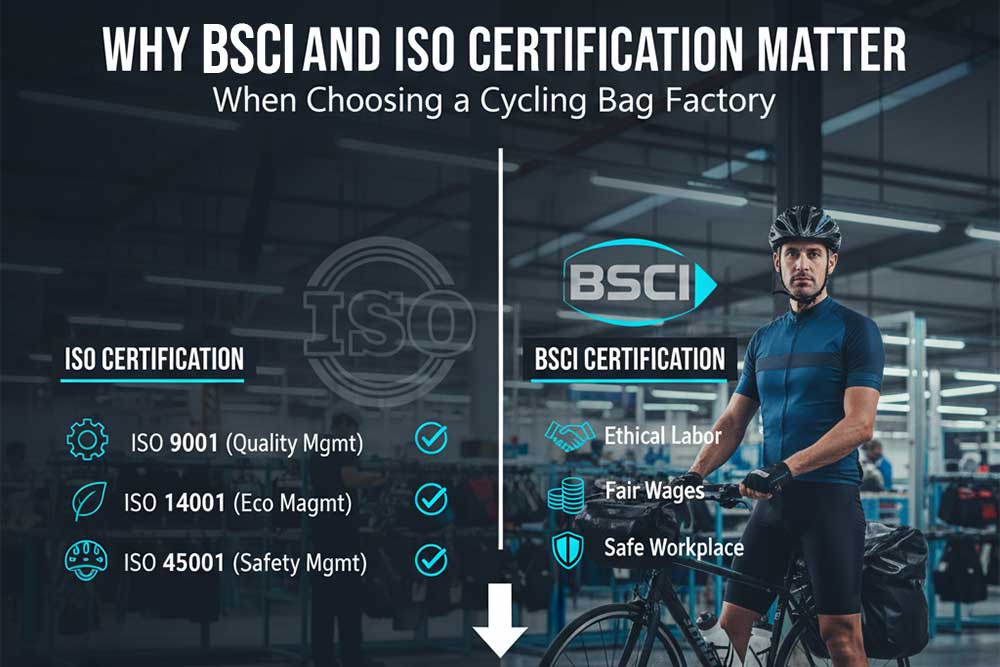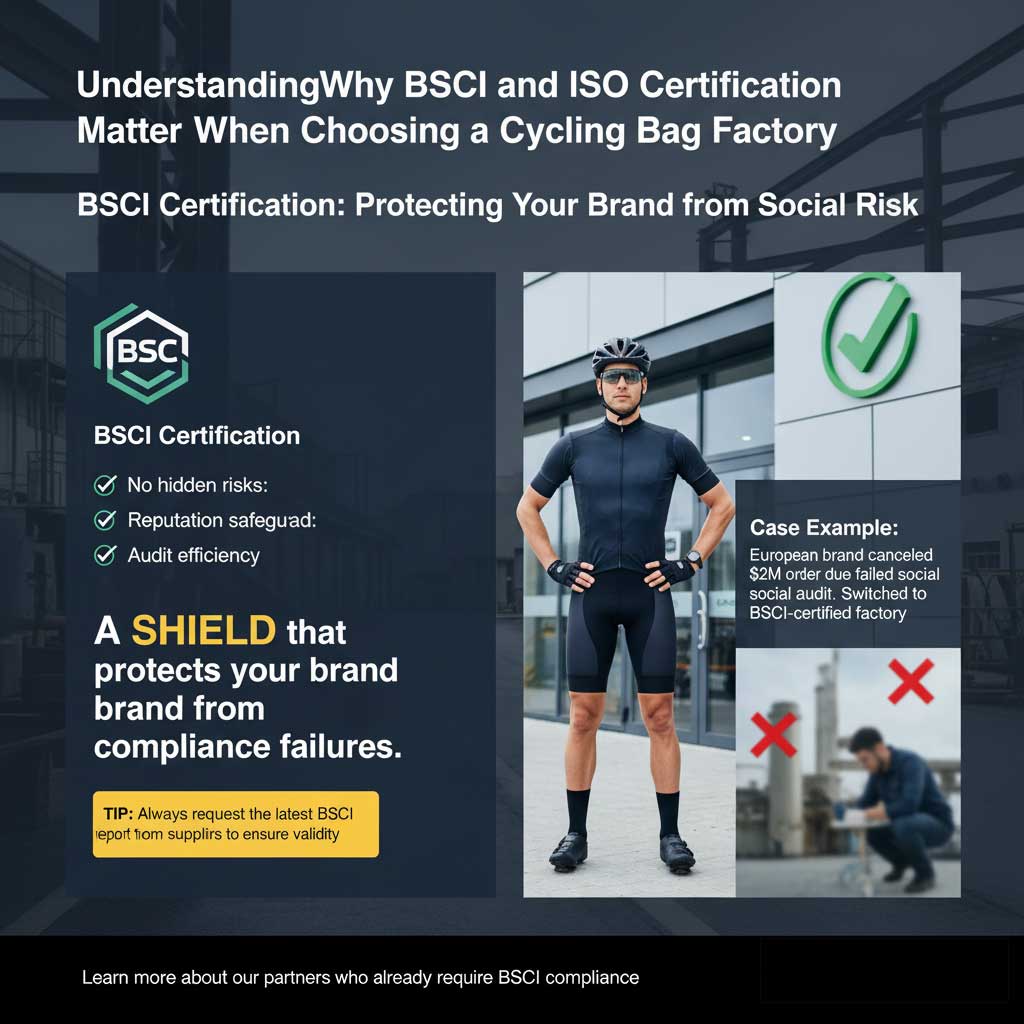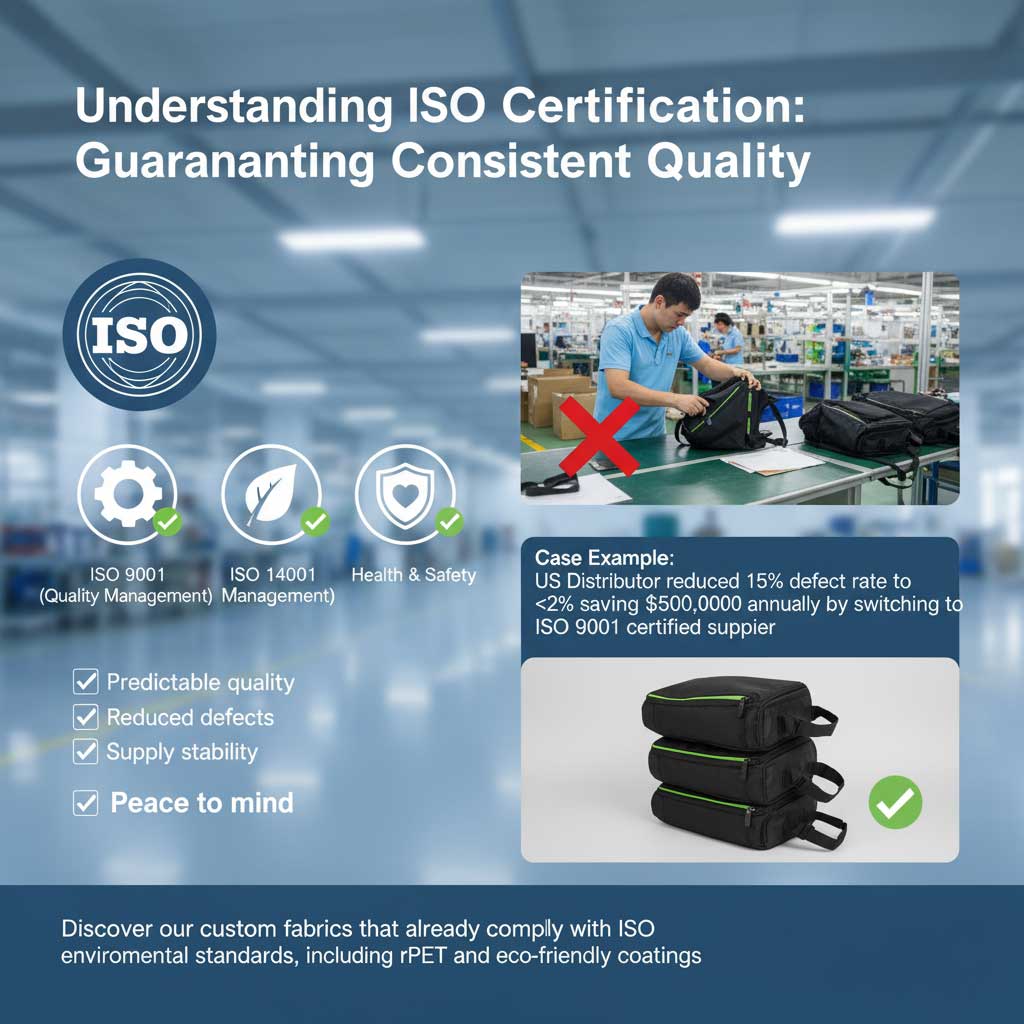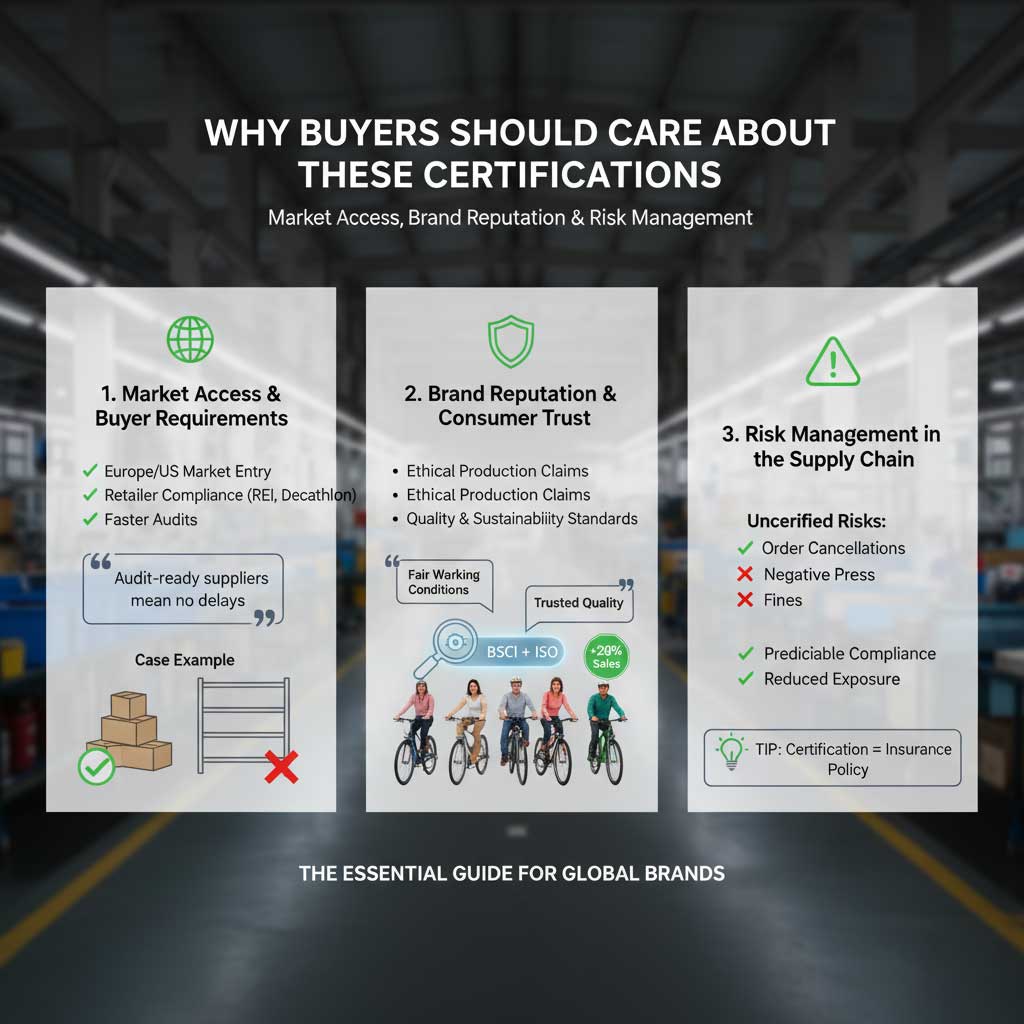Why BSCI and ISO Certification Matter When Choosing a Cycling Bag Factory

Introduction
As a brand owner, wholesaler, or procurement manager, selecting the right cycling bag factory is not just about cost or capacity. It is about risk management, compliance, and long-term supply chain stability.
With global buyers under increasing pressure to ensure ethical sourcing, sustainable production, and consistent product quality, certifications such as BSCI (Business Social Compliance Initiative) and ISO (International Organization for Standardization) have become essential.
This article explains why these certifications are critical for your supply chain, and how choosing a factory with BSCI/ISO compliance directly protects your brand reputation and business interests.
Understanding BSCI Certification: Protecting Your Brand from Social Risk

BSCI certification ensures that a factory operates under internationally recognized social compliance standards. For procurement teams, this means:
- No hidden risks: Factories are audited to confirm no child labor, no forced labor, fair wages, and safe working conditions.
- Reputation safeguard: Your brand avoids association with unethical practices that can lead to public scandals.
- Audit efficiency: Partnering with a BSCI-audited factory saves you time and resources during supplier vetting.
For you as a buyer, this is not just a certificate—it is a shield that protects your brand from compliance failures.
TIP: Always request the latest BSCI audit report from suppliers to ensure validity.
BSCI Core Principles (Simplified)
| Principle | Meaning for Buyers | Impact on Factories |
|---|---|---|
| No Child Labor | Protects brand from scandals | Must verify worker age |
| Fair Wages | Ethical sourcing assurance | Transparent payroll system |
| Reasonable Hours | Prevents labor violations | Requires shift scheduling |
| Health & Safety | Safer production environment | Investment in PPE & training |
| Environmental Care | Supports sustainability goals | Waste and emission management |
Case Example:
A European outdoor brand once had to cancel a $2 million order after discovering its supplier failed a social audit for excessive overtime and unsafe working conditions. By switching to a BSCI-certified cycling bag factory, they reduced compliance risks and were able to confidently expand into new retail channels.
Learn more about our partners who already require BSCI compliance.
Understanding ISO Certification: Guaranteeing Consistent Quality

ISO certifications focus on standardized management systems. The most relevant for cycling bag factories are:
- ISO 9001 (Quality Management) – Ensures consistent product quality and process control.
- ISO 14001 (Environmental Management) – Aligns production with global sustainability goals.
- ISO 45001 (Health & Safety) – Reduces workplace risks that can disrupt production schedules.
For buyers, this translates into:
- Predictable quality: Every production run meets your specifications.
- Reduced defects: Fewer customer complaints and returns.
- Supply stability: A safer, more efficient factory is less likely to face production interruptions.
With ISO-certified suppliers, your procurement team gains peace of mind that orders will be delivered with consistent quality.
Comparison of Key ISO Certifications
| Certification | Focus Area | Buyer Benefit | Example in Cycling Bags |
|---|---|---|---|
| ISO 9001 | Quality Management | Consistent product quality | Waterproof seam testing |
| ISO 14001 | Environmental Mgmt | Sustainability compliance | Use of rPET fabrics |
| ISO 45001 | Health & Safety | Reduced disruption risks | Safer welding workshops |
Case Example:
A US-based distributor of cycling gear faced a 15% product return rate due to inconsistent waterproofing in bags from a non-certified factory. After partnering with an ISO 9001 certified supplier, their defect rate dropped below 2%, saving them over $500,000 annually in returns and logistics costs.
Discover our custom fabrics that already comply with ISO environmental standards, including rPET and eco-friendly coatings.
Why Buyers Should Care About These Certifications

1. Market Access & Buyer Requirements
If your brand sells into Europe, North America, or works with retailers like REI or Decathlon, BSCI and ISO are often mandatory. Choosing a certified factory ensures your products pass retailer audits without delay.
Buyer perspective:
“We need suppliers who are audit-ready so we don’t risk shipment delays or failed compliance checks.”
Case Example:
A global sports retailer rejected several suppliers because they lacked BSCI audits. One cycling bag factory that was already BSCI- and ISO-certified passed the audit immediately and secured a long-term supply contract worth millions.
See our services to learn how we support compliance across global supply chains.
2. Brand Reputation & Consumer Trust
End-consumers today expect not only durable products but also ethical production. By sourcing from BSCI and ISO-certified factories, you can confidently communicate:
- “Our cycling bags are produced under fair working conditions.”
- “We work with factories that follow international quality and sustainability standards.”
This directly strengthens your brand story and consumer trust.
Case Example:
A UK cycling accessories brand highlighted their use of BSCI-audited suppliers in their marketing campaign. Sales increased by 20% within six months as consumers valued transparency and ethical sourcing.
3. Risk Management in the Supply Chain
Uncertified suppliers may pose hidden risks—labor violations, inconsistent quality, or environmental non-compliance. These can cause costly disruptions:
- Order cancellations.
- Negative press.
- Supply chain audits and fines.
Certified factories, on the other hand, provide predictable compliance and reduced exposure.
TIP: Treat certification as an insurance policy against unforeseen supply chain risks.
Supplier Type vs Risk Exposure
| Supplier Type | Risks for Buyers | Consequences |
|---|---|---|
| Non-certified | Audit failures, labor violations | Shipment delays, fines, bad PR |
| BSCI-certified | Social compliance ensured | Smooth retailer approvals |
| ISO-certified | Quality & sustainability guaranteed | Fewer defects & stronger branding |
Case Example:
A global retailer delayed shipments for six months when one of its bag suppliers was flagged for labor violations. Buyers working with BSCI and ISO-certified factories did not experience such disruptions, as certified suppliers had already built strong compliance systems.
Learn more about our shipping services and how certified supply chains reduce logistics risks.
4. Consistent Product Quality
Cycling bags must meet demanding performance standards—waterproofing, durability, and load capacity.
With ISO 9001, you can expect:
- Stitching, zippers, and seams consistently tested.
- Fewer returns or warranty claims.
- Confidence that your brand’s reputation for quality is protected.
Case Example:
An Asian importer sourcing from uncertified suppliers faced frequent zipper breakages and seam failures. After switching to an ISO 9001 certified cycling bag factory, warranty claims dropped by 70%, boosting consumer confidence in the brand.
5. Meeting Sustainability Goals
If your brand has sustainability commitments, sourcing from ISO 14001 factories aligns your products with your corporate ESG strategy.
- Certified factories manage waste, reduce emissions, and use eco-friendly materials (like rPET).
- You can market your cycling bags as sustainably produced with verified compliance.
Buyer perspective:
“Our sustainability team needs suppliers who can provide documented compliance with environmental standards.”
Eco-Materials and Relevant Certifications
| Material | Certification | Buyer Value |
|---|---|---|
| rPET fabric | GRS + ISO 14001 | Verified recycled content |
| TPU coating | ISO 9001 | Durable & waterproof |
| PFAS-free textile | OEKO-TEX | Meets consumer safety requirements |
Case Example:
A Scandinavian cycling brand wanted to launch a new eco-friendly product line. By sourcing from an ISO 14001 and GRS-certified factory, they could prove their cycling bags were made with recycled rPET fabrics. This not only met their sustainability goals but also became a key selling point in their marketing campaigns.
Challenges to Be Aware Of
- Certification costs: Certified factories may charge slightly higher, but you gain reliability.
- Ongoing compliance: Certifications require continuous monitoring—ensure your suppliers stay up to date.
- Small suppliers: Some uncertified factories may offer lower prices but higher risks.
TIP: In procurement, short-term savings from uncertified suppliers often lead to long-term losses.
Beyond BSCI and ISO: Additional Certifications Buyers May Require
To strengthen compliance, many buyers also look for:
- SEDEX / SMETA – Ethical trade audits.
- SA8000 – Advanced labor rights certification.
- GRS (Global Recycled Standard) – For recycled materials.
- OEKO-TEX – Ensures textile safety.
When evaluating suppliers, check if they combine BSCI/ISO with these standards to cover all compliance areas.
Conclusion
For procurement teams and brand managers, working with a BSCI and ISO-certified cycling bag factory is about more than ticking a box.
It means:
- Fewer supply chain risks.
- Faster market access.
- Stronger brand protection.
- Reliable, consistent product quality.
In today’s competitive market, buyers who choose certified partners are not just sourcing bags—they are investing in the future resilience of their supply chains.
FAQ
Q1. Why should buyers prioritize BSCI-certified factories?
A: It protects your brand from labor compliance scandals and ensures suppliers meet ethical sourcing requirements.
Q2. How does ISO 9001 benefit procurement managers?
A: It guarantees consistent product quality, reducing complaints, defects, and costly rework.
Q3. What happens if I source from a non-certified factory?
A: You risk failed audits, shipment delays, brand reputation damage, and potential recalls.
Q4. Do certifications increase costs?
A: Certified factories may charge slightly higher, but the long-term savings from reduced risk and consistent quality far outweigh the difference.
Q5. Which certifications should buyers request in addition to BSCI/ISO?
A: Depending on your brand’s priorities, SEDEX, SA8000, GRS, and OEKO-TEX may also be relevant.
See Also
Top 3 Reasons to Choose Wholesale of Bicycle Bags
Step by Step Guide to the OEM Bicycle Bag Customization Process



Comments are closed